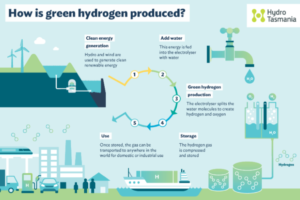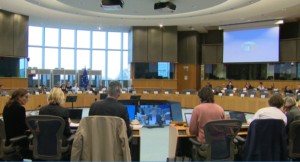Germany: “It makes sense to invest in renewable heating now”
January 22, 2020
The bill to implement Germany’s 2030 climate protection package was passed by the country’s parliament on 15 November 2019 and came into effect at the beginning of this year. It contains a wide variety of provisions that should support the implementation of the national climate action plan, which had already been approved in 2016 and set targets for 2050. We spoke with Wolfram Axthelm, General Manager of the German Renewable Energy Federation, also known as BEE, about the impact of the new act on the use of renewables in the building sector. Axthelm, who is also Managing Director of German wind energy association BWE, has been at the helm of BEE since February 2019.
Photo: BEE
As an advocate for renewable heat, would you say that the decisions made regarding the climate protection package have met your expectations?
Axthelm: The 2030 climate protection package includes several political instruments to meet the targets set in the climate protection act. First and foremost, BEE welcomes the introduction of the act and the binding emission reduction targets for each sector. The heating market is currently dominated by fossil fuels. But considering the large carbon reductions we need by 2030 and beyond, market rules have to change significantly.
Take the building sector, for example, where a significant reduction in carbon emissions can be achieved by adding renewable heat capacity and raising energy efficiency. The climate protection package includes some elements that could spur investment in these areas. Most importantly, BEE greatly appreciates the introduction of carbon pricing in the building and transport sectors, as well as the additional funding made available for clean heat. The grants for replacing oil-fired heating systems and the tax incentives for clean heat could very well lead to considerable investments in buildings, too. Other noteworthy elements of the climate package are a levy on heat and an additional public programme to prompt investment in its large-scale production. However, it is difficult to assess the impact of these instruments, since we have been told little about them so far.
Moreover, the government has yet to establish a proper regulatory framework in the building sector. Scientific studies have clearly demonstrated that in addition to carbon pricing and incentives, the government needs to change laws and regulations, most notably the Gebäudeenergiegesetz [the German Building Energy Act], to significantly reduce carbon emissions.
One of the most important and most heavily debated figures in the climate protection package is the price for a tonne of CO2. The government’s first draft set it to 10 EUR/tonne, but the final package shows 25 EUR/tonne, starting at the beginning of 2021. Is this enough?
Axthelm: Most importantly, we welcome the introduction of a carbon pricing mechanism in the building and transport sectors. Fair market rules are vital to encouraging competition between suppliers of fossil fuels and renewable heat. A carbon price of 10 EUR/tonne would have obviously been no more than a symbolic gesture and would have had absolutely no steering effect on the renewable heat market. Although we are pleased to see that the price was raised to 25 EUR/tonne, it remains insufficient and needs further amendments. Nevertheless, the increase is an important signal to investors and companies that the government is serious about implementing a mechanism that will put a price on carbon emissions, particularly with respect to the typical lifetime of heating systems, which last for 15 to 20 years. Hence, investors will think twice before spending money on heating systems that run on fossil fuels. The message is clear: Carbon prices will rise significantly over the medium term, which means that using fossil fuel heating systems will get much more expensive in the foreseeable future. Therefore, it makes sense to invest in renewable heating now.
If 25 EUR/tonne is insufficient, what for a carbon pricing mechanism would you suggest?
Axthelm: It has been proven that climate change will put a great financial burden on all of society in the future. Germany’s environment agency estimates that these costs come to 180 EUR/tonne. They should, at least partially, be considered if you want to create market rules that will be fair to all. Obviously, the government cannot set a carbon price of 180 EUR/tonne, effective immediately. What we need is a moderate entry-level price, followed by a slow but steady increase.
Consequently, BEE has proposed that current energy taxation be revised to better reflect each fuel’s carbon emissions. For example, we propose an entry-level price of 60 EUR/tonne, combined with a gradual increase of 25 EUR/tonne every four years. As long as carbon prices have no steering effect, the government needs to support the transition to renewable heat and create a suitable regulatory framework.
Which regulations or support measures for renewable heat in the climate protection package fell short of your expectations?
Axthelm: The government has failed to make progress in setting up a regulatory framework. Scientific studies have shown that regulatory changes are needed to meet the carbon reduction targets for 2030. The framework in the building sector is, to a very large extent, governed by the Building Energy Act. The framework described in the climate protection law fails to stipulate appropriate conditions, as the current rules specified in the Erneuerbare-Energien-Wärmegesetz [Renewable Energies Heat Act] and the ENEV energy efficiency standard are simply merged but not developed further. In BEE’s opinion, the draft bill fails to address the requirements of the European Energy Performance of Buildings Directive [EPBD] and those included in the recast of the Renewable Energy Directive [RED II].
The aim of the Green Deal announced by the newly elected EU Commission is to make Europe the first carbon-neutral continent in the world. What does the EU need to do to reach this goal in the heating and cooling sector as well?
Axthelm: BEE welcomes the EU Commission’s initiative for a European Green Deal. It goes without saying that this sort of fundamental transformation requires a plan that combines various political instruments. Europe needs a clear commitment to renewable energy. This commitment should not be limited to the electricity sector but also include heating and cooling and transport.
BEE believes that renewables are more than the key element for protecting the climate. They also offer an economic stimulus for Europe to gain productivity and prosperity. The industry on the continent is ready to invest in green technology, as renewable energies have become cheaper and fully competitive. The transition to a green economy in Europe has just begun and the Green European Deal, as presented by Ursula von der Leyen, is the sort of encouraging narrative needed to support this transition.
Interview conducted by Bärbel Epp
Organisations mentioned in this interview:


